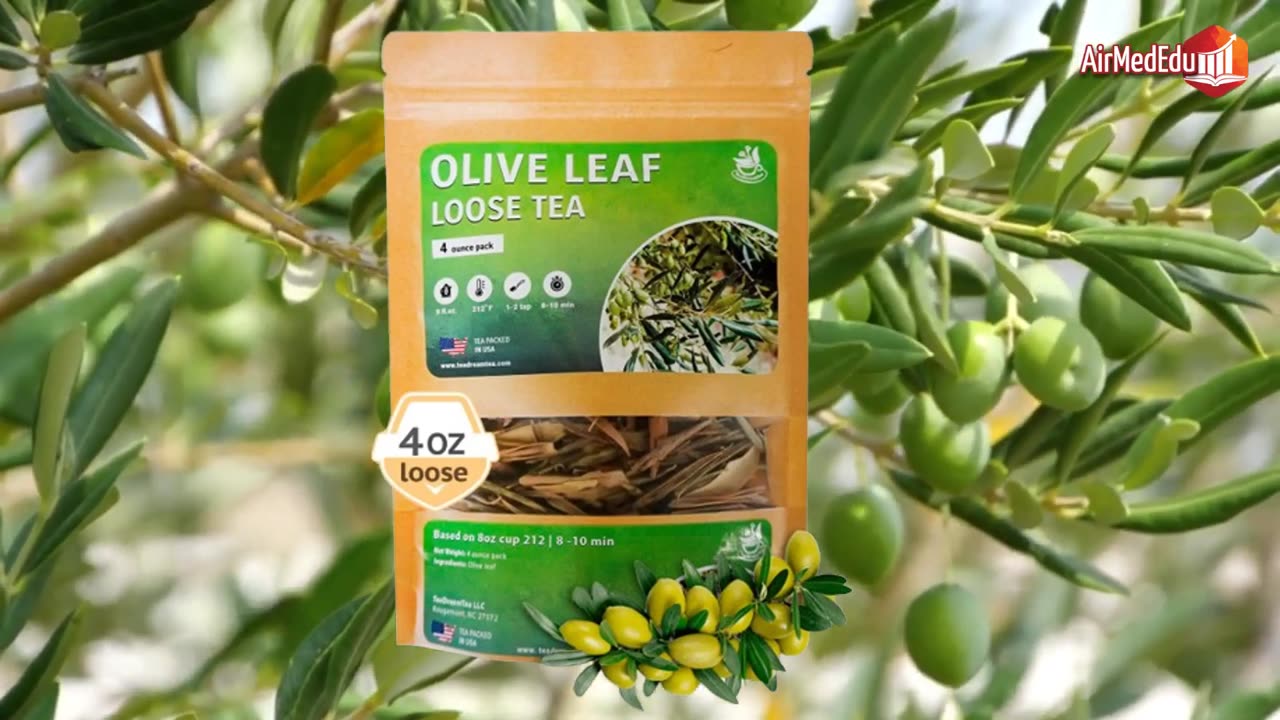Premium Only Content

Olive Leaf Tea, Effects and Benefits, Dosage, Side Effects
Olive leaf tea, derived from the leaves of the Olea europaea tree, has been used for centuries in Mediterranean cultures not only for its connection to olive oil but also for its inherent medicinal properties. This natural remedy, commonly prepared as an infusion, comes from an iconic tree that grows in warm, sunny regions, where the leaves are harvested and dried to preserve its active compounds. Among these, oleuropein stands out, a bitter polyphenol considered primarily responsible for many of its therapeutic effects, along with others such as hydroxytyrosol, tyrosol, and oleocanthal. These elements not only impart a slightly bitter and herbaceous flavor to the beverage, but also interact in complex ways with the human body, offering a range of benefits that have been studied in various scientific studies. As we explore its impact, it is clear that this tea acts as a natural ally for health, although always with the need for conscious consumption.
When olive leaf tea is ingested, its bioactive compounds begin to exert their action in the body in a gradual and multifaceted way. Oleuropein, for example, is metabolized in the small intestine, releasing hydroxytyrosol, which is rapidly absorbed into the bloodstream and distributed to various tissues. This process initiates a cascade of antioxidant effects, where these compounds neutralize free radicals, unstable molecules that can damage cells and contribute to premature aging or the development of chronic diseases. In the cardiovascular system, tea promotes blood vessel relaxation by inhibiting angiotensin-converting enzyme (ACE), similar to how some antihypertensive medications act, reducing vascular resistance and facilitating blood flow. Furthermore, its anti-inflammatory action is due to oleocanthal, which mimics the mechanism of ibuprofen by inhibiting cyclooxygenase, a key enzyme in the production of inflammatory prostaglandins, thus alleviating inflammatory processes in joints, tissues, and internal organs.
At the metabolic level, olive leaf tea influences blood glucose regulation by improving insulin sensitivity in muscle and liver cells, which helps prevent post-meal blood sugar spikes. This hypoglycemic effect is attributed to oleuropein's ability to modulate carbohydrate absorption in the intestine and stimulate insulin secretion by the pancreas. Furthermore, in the digestive system, these compounds stimulate bile production in the liver, facilitating fat digestion and relieving symptoms such as indigestion or chronic constipation. Its antimicrobial action, both antibacterial and antiviral, manifests itself by interfering with the replication of pathogens, strengthening the body's natural barriers against respiratory or skin infections. Overall, these mechanisms not only protect at the cellular level but also contribute to homeostatic balance, enabling the body to better respond to oxidative stress and external aggressions.
The benefits of olive leaf tea are extensive and supported by scientific evidence, starting with its impact on cardiovascular health. By lowering blood pressure, this tea helps prevent complications such as hypertension, angina, and arrhythmias, promoting smoother circulation and reducing the risk of cardiac events. Studies have shown that regular consumption can lower systolic blood pressure by up to 10-15 mmHg in people with mild hypertension, representing a natural support for those seeking alternatives to traditional medications. Furthermore, by inhibiting the oxidation of LDL cholesterol, it contributes to lowering bad cholesterol levels, preventing the formation of atherosclerotic plaques in the arteries and protecting against coronary heart disease. This effect is complemented by its ability to improve the overall lipid profile, increasing beneficial HDL cholesterol.
In terms of metabolic control, one of the most notable benefits is its role in diabetes management and weight control. By regulating blood glucose levels, tea helps stabilize blood sugar, which is particularly useful for people with prediabetes or type 2 diabetes, reducing the need for insulin and preventing complications such as neuropathy or retinopathy. Its diuretic and mild laxative action also promotes the elimination of toxins and the reduction of fluid retention, contributing to gradual weight loss when combined with a balanced diet and exercise. Research indicates that it can accelerate basal metabolism, burning more calories at rest and reducing the accumulation of abdominal fat, a risk factor for metabolic syndrome.
Another notable aspect is its anticancer potential, derived from its potent antioxidants that protect cellular DNA from mutations caused by free radicals. Some in vitro and animal studies have shown that oleuropein can induce apoptosis in cancer cells, such as those found in breast cancer or leukemia, without affecting healthy cells, although further human research is needed to confirm these effects. On the skin, tea acts as a dermatological protector, relieving inflammatory conditions such as eczema, herpes, and burns, thanks to its antiseptic and regenerative action that accelerates healing and reduces dryness. For the immune system, it strengthens defenses by increasing the production of immune cells, helping to fight viral infections such as the flu or the common cold, and reducing symptoms such as fever and cough.
No less important are its benefits for digestive health and anti-inflammatory effects. By stimulating bile secretion, tea relieves liver and gallbladder problems, improving fat digestion, and preventing the formation of gallstones. Its anti-inflammatory effect is comparable to that of nonsteroidal analgesics, relieving joint and muscle pain and conditions such as arthritis, without the adverse gastric effects of these medications. Furthermore, in the neurological sphere, its antioxidants protect the brain from degenerative diseases such as Alzheimer's and Parkinson's by reducing neuronal inflammation and preserving the integrity of synapses.
Regarding the recommended dosage for olive leaf tea, it is essential to follow moderate guidelines to maximize the benefits without incurring risks. It is generally prepared by boiling 5 to 10 grams of dried leaves in 150 to 200 milliliters of water for 10 to 15 minutes, allowing it to steep before straining and consuming. For daily use, it is suggested to drink one to three cups a day, preferably in the morning and afternoon, avoiding the night so as not to interfere with sleep due to its mild stimulant effect. For specific treatments, such as hypertension or glycemic control, a two-week cycle of three cups daily, followed by a week of rest, allows the body to adapt without overloading. If you opt for supplements in extract form, the typical dose ranges from 275 to 500 milligrams per day, divided into two or three doses, but always adjusted according to body weight, age, and individual health status. It is advisable to start with low doses, such as one cup per day, to observe the body's response and consult with a healthcare professional to personalize consumption, especially when combined with other treatments.
Despite its many benefits, olive leaf tea is not without side effects, although these are rare and usually occur with high doses or in sensitive individuals. One of the most common is an excessive drop in blood pressure, which can manifest as dizziness, fatigue, or weakness, particularly in individuals with preexisting hypotension. Similarly, its hypoglycemic effect could cause abrupt drops in blood sugar, resulting in symptoms such as tremors, sweating, or confusion, a greater risk for diabetics on insulin therapy. In the digestive system, high amounts can cause diarrhea, nausea, or stomach upset due to its laxative properties, while in isolated cases, headaches or skin rashes have been reported in olive allergy sufferers. Other less frequent effects include cardiac arrhythmias at very high doses or interactions that amplify the effects of medications, underscoring the importance of careful monitoring.
The necessary precautions to avoid complications when consuming olive leaf tea are essential, starting with a prior medical evaluation, especially in vulnerable groups. Pregnant or breastfeeding women should abstain, as there are insufficient studies confirming its safety for the fetus or infant, and it can alter hormonal balance or cause premature contractions. Likewise, children under six years of age and growing adolescents should avoid it, given that their developing systems may react unpredictably. People with hypotension, chronic fatigue, or digestive problems such as frequent diarrhea should proceed with caution, starting with minimal doses and monitoring symptoms. It is crucial not to combine it with antihypertensive, antidiabetic, or anticoagulant medications without supervision, as this could potentiate their effects and lead to hypoglycemia or bleeding. Furthermore, those with allergies to olive pollen or sensitivity to phenolic compounds should perform a tolerance test, starting with a diluted infusion. It is always recommended to purchase leaves from reliable sources to avoid contaminants, and to discontinue consumption if any adverse signs appear, immediately consulting a specialist.
In short, olive leaf tea represents a valuable natural option for improving overall health, with actions ranging from antioxidant protection to metabolic and cardiovascular support. However, its use must be balanced with knowledge and moderation, recognizing that, although its benefits are promising, it is not a substitute for conventional medical treatments. By integrating this tea into your daily routine, you can safely enjoy its ancient properties, contributing to a holistic well-being that honors the wisdom of Mediterranean nature.
-
 6:49
6:49
The Car Guy Online
10 hours ago $1.51 earned2025–2026 Duramax FAILURES Begin! GM’s NEW Engine Nightmare? Silverado, Sierra, Yukon...
2.92K8 -
 8:34
8:34
Millionaire Mentor
17 hours agoTrump FIRES BACK After Mamdani’s SHOCKING Threat To New York City
5.49K9 -
 53:56
53:56
ZeeeMedia
19 hours agoSilicon Valley, Transhumanists & the Book of Revelation ft. Jay Dyer | Daily Pulse Ep 144
6.99K10 -
 1:02:02
1:02:02
A Cigar Hustlers Podcast Every Day
1 day agoEpisode 4 Hustler Every Day Target 10/4, No More Pennies and Gronk Is The Man
3.53K1 -
 3:07
3:07
GreenMan Studio
1 day agoHOW TO NOT SELL OUT IN 2025 W/Greeman Reports
4.05K6 -
 0:43
0:43
WildCreatures
2 days ago $2.38 earnedDiver is swallowed up by a passing bait ball at Darwin Island
4.89K4 -
 1:54
1:54
Damon Imani
3 days agoDamon Left The View SPEECHLESS on Marriage And Government Overreach
5.99K9 -
 4:09
4:09
Memology 101
14 hours ago $0.72 earned"Journalist" REPEATEDLY tries and FAILS to bait John Fetterman into calling Trump an "AUTOCRAT"
4.84K16 -
 58:02
58:02
Dialogue works
2 days ago $5.97 earnedMatthew Hoh: Ukraine’s Army Is COLLAPSING Everywhere!
28.2K17 -
 17:24
17:24
Nate The Lawyer
2 days ago $2.18 earnedBREAKING: NEW Scientific Evidence Shows Men Are Better in Sports Than Women
13.7K12